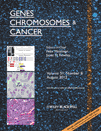
GENES CHROMOSOMES & CANCER
Scope & Guideline
Exploring the Genetic Foundations of Cancer Progression.
Introduction
Aims and Scopes
- Genetic Alterations in Cancer:
The journal emphasizes the role of genetic mutations, fusions, and other alterations in the development and progression of various cancers, including sarcomas, leukemias, and solid tumors. - Molecular Characterization of Tumors:
Research published in the journal often includes comprehensive molecular profiling of tumors, utilizing techniques such as whole-genome sequencing, transcriptome analysis, and targeted gene panels to identify novel genetic alterations. - Tumor Microenvironment and Its Impact:
The journal explores the interactions between tumor cells and their microenvironment, highlighting how these relationships can influence tumor behavior, treatment response, and patient outcomes. - Clinical Implications of Genetic Findings:
A significant focus is placed on the clinical relevance of genetic findings, including their potential for precision medicine, prognostic value, and implications for targeted therapies. - Innovative Diagnostic Approaches:
The journal encourages studies that develop new diagnostic methodologies, such as machine learning applications in pathology, to improve cancer detection and classification.
Trending and Emerging
- Gene Fusion Discovery:
Recent publications highlight an increasing focus on identifying novel gene fusions across various cancer types, particularly in sarcomas, which are crucial for diagnosis and targeted therapy. - Precision Medicine and Targeted Therapies:
There is a growing trend towards research that emphasizes precision medicine, with studies exploring the therapeutic implications of specific genetic alterations and the development of targeted treatments. - Integration of Multi-Omics Approaches:
The use of multi-omics strategies that combine genomic, transcriptomic, and epigenomic data to provide comprehensive insights into tumor biology is on the rise, reflecting a trend towards holistic cancer research. - Tumor Microenvironment Interactions:
Emerging themes include the study of tumor microenvironment interactions and their effects on tumor progression and treatment responses, highlighting the complexity of cancer biology. - Artificial Intelligence in Cancer Research:
The incorporation of artificial intelligence and machine learning in cancer diagnostics and prognostication is increasingly prevalent, marking a significant shift towards computational approaches in oncology.
Declining or Waning
- Traditional Cytogenetic Techniques:
There is a noticeable decline in studies focusing on conventional cytogenetic techniques, such as karyotyping, as newer genomic technologies like next-generation sequencing gain prominence. - Generalized Cancer Epidemiology Studies:
Research that broadly examines cancer incidence and prevalence without a strong genetic or molecular focus appears to be waning, as the field shifts towards more targeted and mechanistic investigations. - Non-Genetic Factors in Cancer:
While still important, the emphasis on non-genetic factors, such as lifestyle and environmental influences on cancer risk, seems to be decreasing in favor of genetic and molecular research. - Basic Laboratory Studies Without Clinical Correlation:
There is a trend away from purely laboratory-based studies that do not translate into clinical implications, as the journal increasingly prioritizes research with direct relevance to patient care and treatment.
Similar Journals

GENE
Fostering Academic Excellence in Genetics and MedicineGENE, an esteemed journal published by Elsevier, serves as a vital resource for researchers and professionals in the fields of genetics and medicine. With an ISSN of 0378-1119 and an E-ISSN of 1879-0038, this scholarly journal has been at the forefront of genetic research since its inception in 1976 and is set to continue until 2025. Situated in the Netherlands, GENE is recognized for its significant contributions, reflected in its Q2 ranking in both Genetics and Miscellaneous Medicine categories for 2023. This positioning within the Scopus rankings demonstrates its impact and relevance in a competitive field, where it holds the rank of #129 out of 347 in Genetics, placing it within the 62nd percentile. Although it does not offer open access options, GENE provides invaluable insight into contemporary genetic research, thereby fostering academic discussions and advancements. Researchers, professionals, and students alike will find GENE an essential platform for disseminating knowledge and exploring innovative developments in genetics and associated sciences.

Cancers
Advancing cancer research for a healthier tomorrow.Cancers is a leading peer-reviewed journal published by MDPI, dedicated to advancing the field of oncology and cancer research. Established in 2009 and based in Switzerland, this Open Access journal provides a platform for the rapid dissemination of high-quality research findings, reviews, and clinical studies related to all aspects of cancer biology and treatment. With an impressive impact factor and recognized as Q1 in Oncology and Q2 in Cancer Research for 2023, Cancers strives to foster a collaborative environment among researchers, healthcare professionals, and students seeking to deepen their knowledge and understanding of cancer. The journal’s commitment to accessibility and its broad scope make it an invaluable resource for anyone passionate about combating cancer and improving patient outcomes. For more information and to access its diverse publications, visit the journal’s website.

Cancer Research Communications
Empowering global collaboration in cancer research.Cancer Research Communications is an esteemed journal published by the American Association for Cancer Research, a leading organization in the field of oncology. This journal aims to advance knowledge in cancer research through the dissemination of high-quality, peer-reviewed articles that cover a wide range of topics related to cancer biology, treatment modalities, and prevention strategies. As an open-access journal, Cancer Research Communications ensures that vital research findings are accessible to a global audience, promoting collaboration and innovation within the scientific community. The journal serves as a crucial platform for researchers, professionals, and students to share their insights and foster the exchange of effective cancer therapies and methodologies. With a commitment to excellence, it plays a significant role in shaping the future of cancer research and therapeutic development.

INTERNATIONAL JOURNAL OF ONCOLOGY
Transforming discoveries into impactful cancer solutions.INTERNATIONAL JOURNAL OF ONCOLOGY is a leading academic publication dedicated to advancing the field of cancer research and treatment. Published by SPANDIDOS PUBL LTD in Greece, this journal, with ISSN 1019-6439 and E-ISSN 1791-2423, has established itself as a reputable source of peer-reviewed articles since its inception in 1993. With an impressive Q2 ranking in both Cancer Research and Oncology categories, as well as high Scopus ranks reflecting its significant contribution to the fields of Medicine and Biochemistry, the journal offers a platform for researchers, clinicians, and students alike to disseminate their findings and engage in dialogue surrounding innovative practices and breakthroughs. Although the journal follows a traditional subscription model, it continues to attract a diverse readership interested in the latest developments in oncological research, providing essential insights into cancer biology, therapeutics, and patient care. With a commitment to excellence, the INTERNATIONAL JOURNAL OF ONCOLOGY plays a vital role in shaping the future of oncology research and is a must-read for anyone passionate about advancing cancer treatment and prevention.
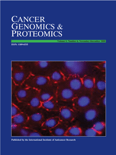
Cancer Genomics & Proteomics
Advancing cancer research through genomics and proteomics.Cancer Genomics & Proteomics is a pivotal journal published by the International Institute of Anticancer Research, dedicated to advancing the fields of cancer genomics and proteomics. Established in 2004 and running until 2024, this journal provides a vital platform for the dissemination of high-quality research that explores genetic and protein interactions in cancer, thereby fostering innovations in diagnostics and therapeutics. The journal boasts a commendable Q2 ranking in Biochemistry and Genetics and is recognized in the Q3 tier for its contributions to Cancer Research and Molecular Biology, reflecting its growing impact in these dynamic fields. Operating out of Greece, it engages a diverse audience, including researchers, clinicians, and students, by sharing significant findings and methodological advancements in the realm of cancer studies. While currently not an open-access publication, Cancer Genomics & Proteomics remains committed to enriching scientific dialogue and collaboration with its insightful articles and reviews.

JCO Precision Oncology
Transforming Cancer Care Through Precision InsightsJCO Precision Oncology, published by Lippincott Williams & Wilkins, is a leading journal in the field of cancer research and oncology, recognized for its high-impact contributions and innovative approaches to precision medicine. Since its inception in 2017, this journal has consistently ranked in the Q1 category in both Cancer Research and Oncology for 2023, reflecting its esteemed position within the academic community. With a rigorous peer-review process and a focus on disseminating cutting-edge research, JCO Precision Oncology serves as a vital platform for researchers, clinicians, and healthcare professionals aiming to enhance the understanding and treatment of cancer through individualized therapies. The journal's comprehensive scope includes studies on genetic profiling, biomarker research, and novel therapeutic strategies, making it an essential resource for anyone involved in cancer care and research. Explore further and join a community committed to advancing precision oncology and improving patient outcomes.
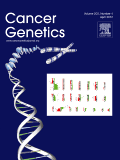
Cancer Genetics
Unlocking the Secrets of Cancer Through GeneticsCancer Genetics is an esteemed peer-reviewed journal dedicated to advancing the field of cancer research through the lens of genetics. Published by Elsevier Science Inc and available in both print (ISSN: 2210-7762) and online (E-ISSN: 2210-7770), this journal aims to provide a platform for the dissemination of high-quality studies that unravel the genetic underpinnings of cancer. Since its inception in 2011, Cancer Genetics has become a significant resource for researchers, professionals, and students with a shared interest in understanding the intricate relationship between genetics and oncogenesis. With an impact factor that reflects its influence, the journal has maintained a Q3 ranking in Cancer Research, Genetics, and Molecular Biology as of 2023, indicating its growing importance in these fields. Additionally, the journal offers open access options to ensure that crucial findings are easily accessible to the global research community. By bridging the gap between genetics and cancer studies, Cancer Genetics plays a pivotal role in fostering innovation and collaboration among scientists and clinicians striving to improve cancer diagnosis and treatment.
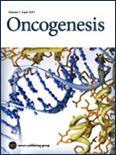
Oncogenesis
Empowering researchers with open access to vital findings.Oncogenesis is a prestigious open access journal, published by SpringerNature, dedicated to advancing our understanding of cancer biology and molecular mechanisms of oncogenesis. Since its inception in 2012, this journal has quickly established itself as a leading platform for innovative research, being ranked in the Q1 quartile in both Cancer Research and Molecular Biology categories for 2023. With an admirable impact factor that reflects its exceptional quality, Oncogenesis is indexed in Scopus, holding notable rankings in both Molecular Biology and Cancer Research, placing in the 87th and 83rd percentile respectively. The journal not only facilitates the dissemination of groundbreaking research but also encourages collaboration among scientists and healthcare professionals across the globe. By offering open access to its articles, Oncogenesis ensures that vital findings reach a diverse audience, fostering a deeper dialogue and understanding in the fight against cancer. Based in the United States but with a global reach, the journal remains committed to publishing high-impact studies that contribute to the advancement of knowledge in the realms of oncology, biochemistry, and genetics.

Advances in Cancer Biology-Metastasis
Unraveling the Secrets of Metastasis.Advances in Cancer Biology-Metastasis is an emerging journal published by Elsevier, aimed at advancing our understanding of the complexities of cancer biology, with a specific focus on the mechanisms and pathways related to metastasis. With an E-ISSN of 2667-3940, this journal offers a platform for researchers, professionals, and students in the fields of Cancer Research and Cell Biology to disseminate innovative findings and discuss novel therapeutic approaches. Though currently classified in the Q4 quartile across both Cancer Research and Cell Biology categories, the journal aspires to enhance its impact through rigorous peer review and high-quality publication. Positioned to cover the years from 2021 to 2024, it seeks to bridge gaps in foundational knowledge and promote collaborative research efforts that could pivot the current understanding of cancer metastasis. Researchers are encouraged to take advantage of this platform to advocate for advancements in cancer biology, making significant contributions that can influence both academic and clinical practices.
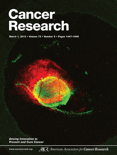
CANCER RESEARCH
Shaping the future of cancer research with excellence.Cancer Research, published by the American Association for Cancer Research, is a premier journal in the field of oncology, renowned for its commitment to advancing cancer research since its inception in 1941. With an impressive impact factor reflecting its vital role in the field, this journal consistently ranks in the Q1 quartile for both Cancer Research and Oncology, positioning it among the top 7.5% of journals in these categories. The journal serves as a crucial platform for researchers, professionals, and students to disseminate and gain insights into groundbreaking studies that shape our understanding of cancer biology, prevention, diagnosis, and treatment. While it is not an open-access publication, its rigorous peer-review process ensures that only high-quality research is published, thus maintaining a standard of excellence in the scientific community. With a strong legacy and an ever-expanding influence, Cancer Research continues to be essential for anyone dedicated to the fight against cancer, showcasing cutting-edge research that drives scientific discovery and innovation.